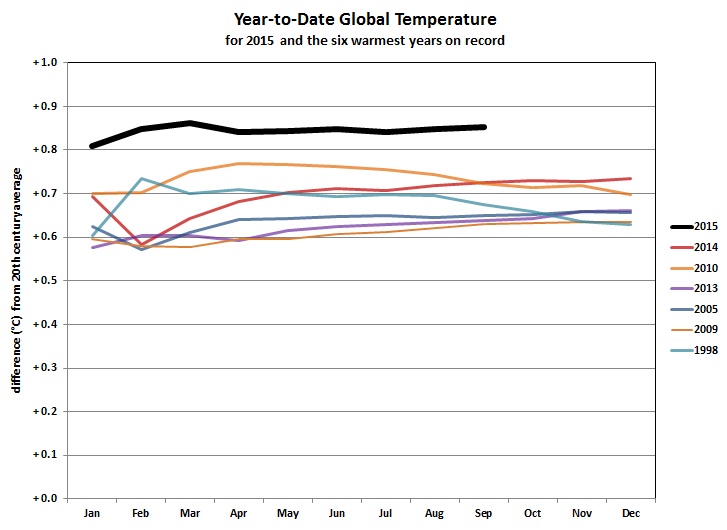Climate change update
October 2015
There’s so much happening on the international stage this year. You probably already know that record greenhouse gases levels, and strong El Niño event, will make this the hottest year on Earth since records began. Here is the latest data from NOAA (National Oceanic and Atmospheric Administration):

For more information, click here.
The Time of Emergence
Inaugural lecture by Prof James Renwick
Notes by Jonathan Kennett
Hundreds of people attended the inaugural lecture of Professor James Renwick at Victoria University last week. After explaining the causes and dangers of climate change – familiar ground for most of us – he dived into two new topics.
The first was why the poles are reacting differently to climate change. In the past the poles have warmed twice as much, or cooled twice as much, as the global average temperature change. That is certainly happening in the Arctic at the moment, where it has lost approximately 40% of its ice in recent decades.
But, explained the professor, the Antarctic has had a 5% ice gain! This is where the things get interesting –sign up for Geol 321 at Victoria University for the full story.
In a nutshell, the Arctic ice is all floating, and it’s only a few metres thick. The Antarctic ice on the other hand, is up to 4000m thick and is mostly grounded on land (not floating). Also, taking look at the globe, the Arctic is mostly surrounded by large continents, whereas the Antarctic is surrounded by huge seas that are blasted by the Roaring Forties.
So the Artic is warming up and melting and disappearing. The Antarctic also has some melting going on, but this is tempered by a cooling effect from the Ozone hole. All the same, huge amounts of fresh water from ice melt are heading out to sea, and fresh water freezes more easily than saltwater. Thus more ice (accompanied by a little more sea level rise).
The second topic was “The Time of Emergence”. The professor clearly outlined that we have to stick to a carbon budget to stay below 2 degrees (the safe limit of average global warming). We are currently on course to use that budget up within 20 years. But the Time of Emergence varies around the globe. Here in NZ it is actually 2070-2080, long after average global temperatures reach 2 degrees. In most of the Northern Hemisphere it is 2030-2040. In much of North Africa it is only 2020-2030. And in the Arctic, it is just a few years away.
New Zealand may be lucky, but we are not totally isolated from the rest of the world.
Those areas that reach the Time of Emergence first, are the ones to worry about most. They will continue getting more droughts, famine, disease (both plants and animals) and increased fires, as well as impacts from sea level rise and ocean acidification.
Can we stop climate change? “Yes!” he said. We have technologies that can be used. We can stop dairy intensification. We can plant trees.
What is needed to stop climate change? Here the professor went beyond the ivory tower and spoke in practical terms. He pointed out we need “political will” to introduce new policies, new incentives, and new legislation.o happen because ‘business as usual’ is lead towards catastrophic climate change.

Most Credible Sources of Climate Change Science
There is so much misinformation about climate science on the internet, but it is easy to avoid. Simply ask yourself, is this website produced by an internationally credible scientific organisation!
It is hard to find clearer more solid science than from NASA : http://climate.nasa.gov/
But you can also try any national scientific organisation, such as the Royal Society from New Zealand, Australia or the UK, or an Academy of Science from France, Germany or the USA.
Try the AAAS (American Association for the Advancement of Science): http://whatweknow.aaas.org/
Or check out the Royal Society of New Zealand – it’s their job to inform us about science: http://www.royalsociety.org.nz/teaching-learning/resources/gamma/climate-change/
But if you are really pressed for time and only have 60 seconds, then check out this video from the UK Royal Society: https://royalsociety.org/topics-policy/projects/climate-evidence-causes/
Those four sites provide excellent science, and links to plenty more credible sources of information.